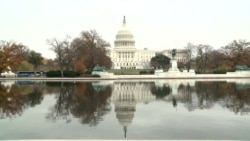Uncertainty grips the U.S. Congress, where no consensus replacement has emerged to succeed Republican House Speaker John Boehner after his surprise resignation announcement. Amid the chaos, half of Congress is effectively leaderless weeks before America risks defaulting on its national debt and enduring another partial government shutdown.
From Sam Rayburn to Tip O’Neill to Newt Gingrich and beyond, giants of America’s political landscape have wielded the gavel as House speaker, one of Washington’s most powerful positions. The speaker is third in the line of presidential succession, behind the vice president, and, except in rare instances, no bill becomes law in America without the speaker agreeing to bring it to the House floor for a vote.
With such lofty power on the line, an unlikely paradox has emerged: big-name House Republicans who could potentially rally enough support to become speaker are reluctant to seek the position, while lesser-known representatives eager for the post do not command a following large enough to secure it at present.
“We need a fresh start,” said Congressman Jason Chaffetz, a declared contender for speaker, on ABC’s This Week program. “I’ve earned a reputation of being fair, and that I’ll hear all sides from the entire political spectrum. And really the role of the speaker is to be the constitutional officer that makes sure the process is fair, that it’s balanced.”
Representing Utah, Chaffetz is chairman of the House Committee on Oversight and Governmental Reform. While touting his credentials, Chaffetz says he would withdraw his bid if a colleague favored by Republican Party elders, Congressman and 2012 vice presidential contender Paul Ryan, entered the fray.
But Ryan says he doesn’t want to be speaker, a stance repeatedly confirmed by his staff in recent days.
Ryan and Chaffetz are both fiscal conservatives committed to shrinking the size of government. But neither is radical enough for a House Republican faction demanding total political warfare against President Barack Obama. The split between establishment and ultra-conservative Republicans has frayed party unity in recent years, and is now on full display as a primary driver of the current chaos on Capitol Hill.
“The truth is, they don’t know what they are going to do,” said former Republican Congressman Vin Weber, who served during the speakership of Newt Gingrich in the 1990s.
If no consensus candidate emerges, Weber suggests an unprecedented move: electing an interim or caretaker speaker.
“I think they should buy themselves some time and figure out who, among the existing members or maybe even somebody from the outside could do the job just for a little over the next year, and give Republicans time to sort it out,” Weber said.
Democrats and the White House are bystanders to the drama.
“There’s a minority group of conservative Republican politicians that places their own extreme ideology ahead of everything else,” said White House spokesman Josh Earnest last week.
Congress will return from recess next week facing hard deadlines on momentous legislation to raise the federal debt ceiling and fund the U.S. government beyond December 11. At this point, it is not certain a new speaker will be in place before either deadline arrives.
Until the crisis is resolved, Speaker Boehner has no choice but to put his retirement on hold.





